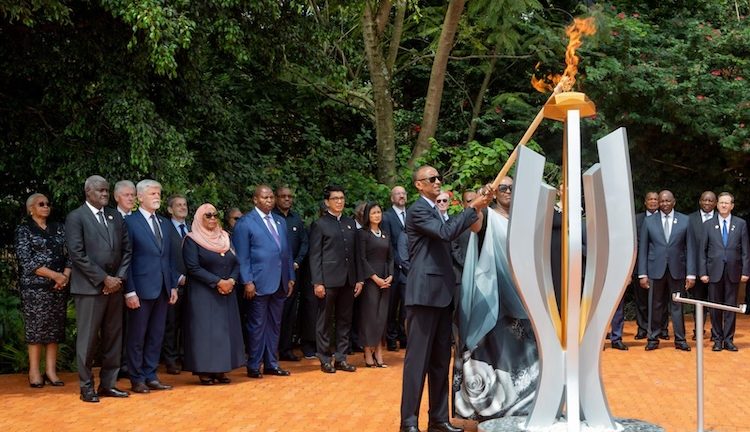By Lisa Vives, Global Information Network
NEW YORK | 7 April 2024 (IDN) — Rwandans are marking the 30th anniversary of a genocide that took the lives of an estimated 800,000 mostly ethnic Tutsis over 100 days between April and June 1994.
President Paul Kagame and First Lady Jeannette Kagame laid wreaths at the Kigali Genocide Memorial. The President then lit the “Flame of Remembrance” before making a speech at an arena in Kigali, the capital of Rwanda.
In September, the Flame will be lit for seven days at four genocide memorial sites inscribed on the World Heritage List of the United Nations Educational, Scientific and Cultural Organization.
Other commemorative activities will be conducted nationwide, including a Walk to Remember in Kigali, followed by a night vigil.
A senior program advisor on transitional justice at the Kenya Human Rights Commission, Martin Mavenjina, emphasized the significance of remembering the genocide.
“It’s not just as a moment of remembrance,” he said, “but an opportunity for victims and survivors to reflect, heal, and look towards the future.
“It reassures the world that never again will such an event happen anywhere on this continent or even anywhere (else) in the world.”
Supporters of Kagame’s rule applaud him, saying that without his firm grip on power, Rwanda could slide back to the chaos that could ignite another genocide.
But human rights leaders and activists differ with that view. Kagame, they say, has oppressed his opponents and killed and imprisoned his critics. Dissidents are jailed, free speech is curtailed and political opponents often die in murky circumstances, even those living in the West.
Ethnic divisions
Ethnic divisions persist under the authoritarian president who has ruled for just as long, writes New York Times reporter Declan Walsh. Soldiers under President Kagame have been accused of massacre and plunder in the neighboring Democratic Republic of Congo.
This view was supported by the transitional justice advisor. He urged Kagame to loosen his grip on power and allow for more freedom.
For decades, Western leaders have looked past Mr. Kagame’s abuses, comments Walsh. “Some have expressed guilt for their failure to halt the genocide when Hutu extremists massacred people mostly from Mr. Kagame’s Tutsi ethnic group.”
Kagame took that view a step further, blaming the inaction of the international community for allowing the 1994 genocide to happen.
“It was the international community which failed all of us, whether from contempt or cowardice,” Kagame said in a speech after laying a wreath at a memorial site holding the remains of 250,000 genocide victims in Kigali.
The killings were ignited when a plane carrying then-President Juvénal Habyarimana, a Hutu, was shot down over Kigali. The Tutsis were blamed for downing the plane and killing the president and became targets in massacres led by Hutu extremists that lasted over 100 days. Some moderate Hutus who tried to protect members of the Tutsi minority were also killed.
Some Western leaders have now expressed regret.
Bill Clinton, after leaving office, cited the Rwandan genocide as a failure of his administration. French President Emmanuel Macron, in a prerecorded video, said that France and its allies could have stopped the genocide but lacked the will to do so. Macron’s declaration came three years after he acknowledged the “overwhelming responsibility” of France—Rwanda’s closest European ally in 1994—for failing to stop Rwanda’s slide into the slaughter.
But in truth, few voices were heard in opposition to the U.S.—few, at least, with the will and means to back up their arguments with substantial commitments of their own.
Even after the storm broke, the UN reaction was to retreat, to reduce rather than increase its forces in the riven country.
Some Rwandans fear that nothing has been learned—that the outside world will intervene too late, with too little, elsewhere.
Rwanda also has had troubled relations with its neighbors.
Recently, tensions have flared with Congo, with the two countries’ leaders accusing one another of supporting armed groups. Relations have been tense with Burundi as well over allegations that Kigali is backing a rebel group attacking Burundi. And relations with Uganda are yet to fully normalize after a period of tensions stemming from Rwandan allegations that Uganda was backing rebels opposed to Kagame. [IDN-InDepthNews]
Photo: Rwanda Rises: 30 years on from the genocide against the Tutsi. Credit: Commonwealth
IDN is the flagship agency of the Non-profit International Press Syndicate


